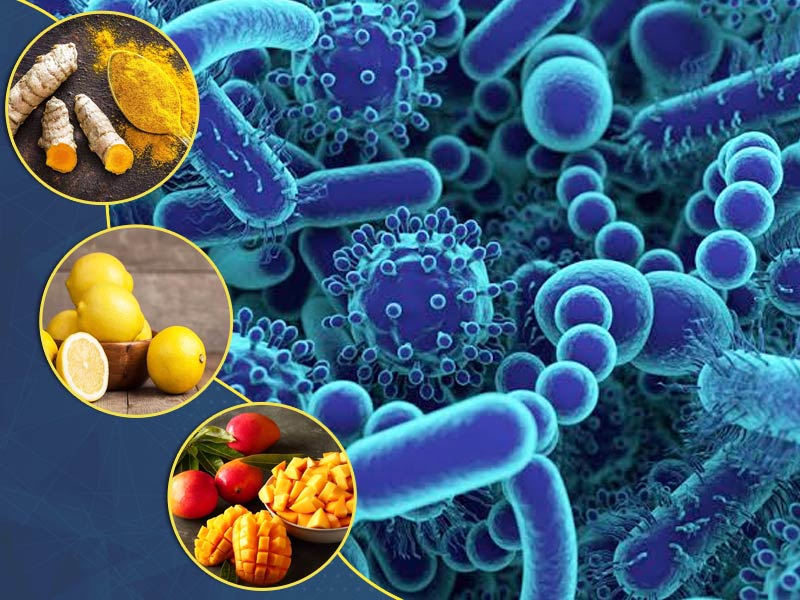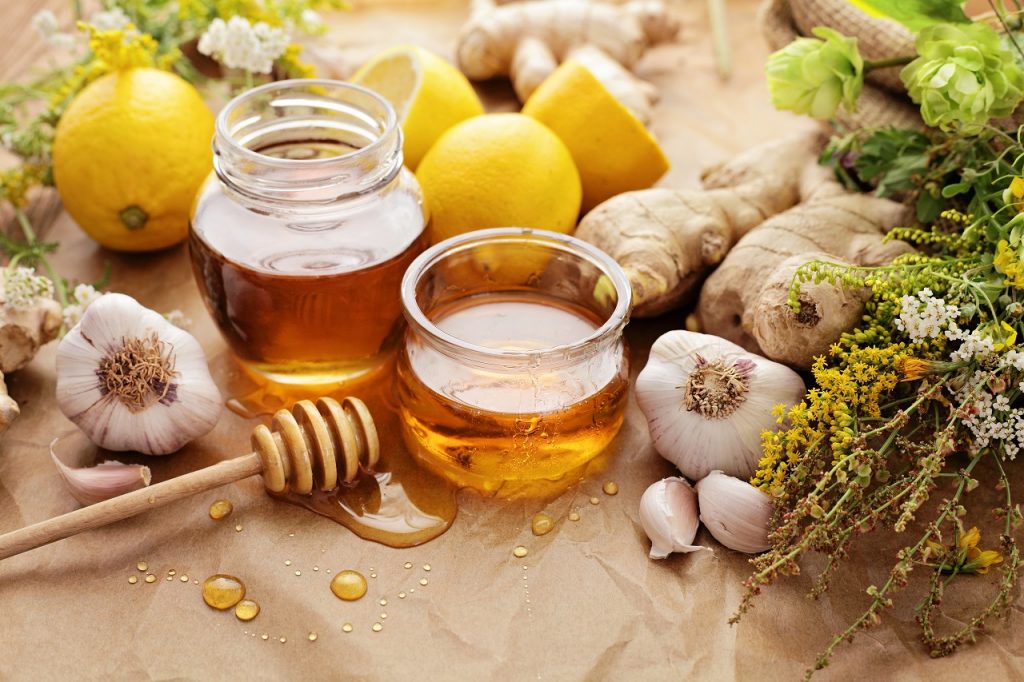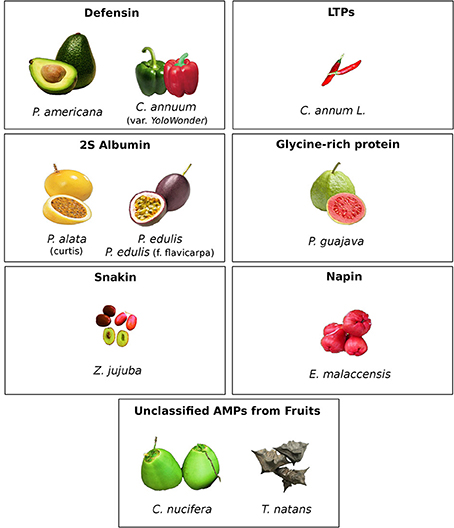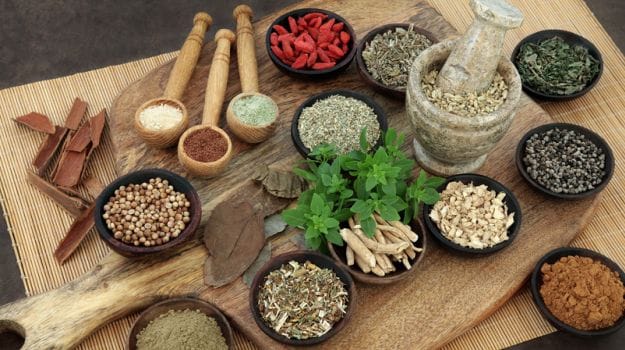Which fruit kills bacteria

In the realm of wellness and nutrition, the age-old quest for foods that possess medicinal properties continues. Among the nature's bounty, fruits have long been revered for their health-promoting compounds. But what if certain fruits held the key to combating the invisible enemy lurking in our midst—bacteria?
Join us on an intriguing exploration of the world of fruits that have demonstrated remarkable antibacterial capabilities. From the vibrant hues of berries to the tropical allure of citrus, we uncover the hidden powers of these natural healers. Discover which fruits have earned their place as formidable foes of bacteria, offering insights into their unique defense mechanisms and the potential implications for our health and well-being.
Which Fruits Possess Antibacterial Properties?
While no fruit completely "kills" bacteria in the way an antibiotic does, many fruits contain compounds with antibacterial activity. This means they can inhibit the growth and spread of certain bacteria, contributing to overall health and potentially preventing infections. The effectiveness varies greatly depending on the fruit, the specific bacteria, and the concentration of the active compounds. It's crucial to remember that fruit consumption should be part of a balanced diet and not a replacement for medical treatment when bacterial infections are present.
Cranberries: Fighting Urinary Tract Infections
Cranberries are well-known for their potential to prevent urinary tract infections (UTIs). They contain compounds like proanthocyanidins (PACs) that prevent E. coli bacteria from adhering to the walls of the urinary tract. This prevents the bacteria from establishing a colony and causing infection. While cranberries don't kill the bacteria directly, they hinder their ability to colonize, thus reducing the risk of UTIs. It's important to note that cranberry juice's effectiveness varies and isn't a guaranteed cure for UTIs; it's best used as a preventative measure or in conjunction with medical advice.
Garlic: A Natural Antibiotic?
While not technically a fruit, garlic is often included in discussions about natural antibacterial agents. It contains allicin, a potent compound with strong antibacterial properties. Allicin has been shown to be effective against a broad spectrum of bacteria, including Salmonella, E. coli, and Staphylococcus aureus. The effectiveness of allicin depends on factors like the preparation method and the concentration consumed. Note that raw garlic provides the highest concentration of allicin.
Citrus Fruits: Vitamin C and Antibacterial Effects
Citrus fruits, such as oranges, lemons, and grapefruits, are rich in vitamin C, a powerful antioxidant that supports the immune system. While vitamin C itself doesn't directly kill bacteria, it plays a crucial role in bolstering the body's natural defenses against infection. Moreover, some citrus fruits contain other compounds with mild antibacterial properties. However, relying solely on citrus fruits to fight bacterial infections is not recommended.
Blueberries: Antioxidant Powerhouse
Blueberries are packed with antioxidants, including anthocyanins, which have demonstrated some antibacterial activity in laboratory settings. These antioxidants help protect cells from damage caused by bacteria and other harmful substances. However, the impact of blueberry consumption on bacterial infections in humans is less clear-cut and needs further research.
Mangoes: Potential Antibacterial Compounds
Mangoes contain various compounds that show promise in antibacterial studies. These compounds, present in different parts of the mango (flesh, peel, seed), exhibit activity against certain bacteria. Research in this area is ongoing, and more studies are needed to fully understand the extent of mangoes' antibacterial capabilities and their effectiveness in human health.
| Fruit | Active Compound(s) | Bacteria Affected | Mechanism of Action |
|---|---|---|---|
| Cranberries | Proanthocyanidins (PACs) | E. coli | Prevents bacterial adhesion |
| Garlic | Allicin | Salmonella, E. coli, Staphylococcus aureus | Direct antibacterial effect |
| Citrus Fruits | Vitamin C, other compounds | Various | Immune system support, mild direct effect |
| Blueberries | Anthocyanins | Various | Antioxidant protection, some direct effect |
| Mangoes | Various compounds | Various | Research ongoing |
What fruit kills bacteria inside the body?

No single fruit can definitively be said to "kill" bacteria inside the body. The human immune system is primarily responsible for fighting off bacterial infections. However, certain fruits contain compounds that possess antibacterial properties and can support the immune system's function, contributing to a healthier environment less hospitable to bacterial growth. It's crucial to remember that consuming fruit alone won't cure a bacterial infection; medical treatment is necessary for serious cases.
Cranberries and Urinary Tract Infections
Cranberries are frequently cited for their potential role in preventing urinary tract infections (UTIs). They contain compounds called proanthocyanidins (PACs) that prevent bacteria, particularly E. coli, from adhering to the walls of the urinary tract. This prevents bacteria from establishing a colony and causing infection. It's important to note that cranberries are not a cure for UTIs, and medical attention is crucial for diagnosed infections.
- PACs inhibit bacterial adhesion: The main mechanism of action is the prevention of bacterial attachment to urinary tract cells.
- Increased urine acidity: Some studies suggest cranberries may slightly increase urine acidity, creating a less favorable environment for bacterial growth.
- Improved immune response: While not directly killing bacteria, cranberries may support the immune system’s ability to fight infection.
Citrus Fruits and Vitamin C
Citrus fruits like oranges, lemons, and grapefruits are rich in Vitamin C, a potent antioxidant. While Vitamin C doesn't directly kill bacteria, it plays a crucial role in supporting the immune system. A strong immune system is essential for effectively combating bacterial infections. The antioxidant properties of Vitamin C may also help protect cells from damage caused by bacterial infections.
- Enhances immune cell function: Vitamin C is vital for the production and function of white blood cells, which are crucial for fighting infections.
- Antioxidant properties: Vitamin C helps neutralize free radicals produced during infection, reducing cellular damage.
- Collagen synthesis: Vitamin C is essential for collagen production, crucial for tissue repair after infection.
Pomegranates and Antibacterial Compounds
Pomegranates contain various bioactive compounds, including punicalagins and ellagitannins, which have demonstrated antibacterial activity against several bacterial strains in laboratory settings. These compounds can inhibit bacterial growth and even kill some bacteria, although more research is needed to fully understand their effectiveness in the human body.
- Inhibition of bacterial growth: Studies show pomegranate extracts can inhibit the growth of various bacterial species.
- Potential for biofilm disruption: Some research suggests pomegranate extracts may disrupt bacterial biofilms, making them more susceptible to antibiotics.
- Multiple mechanisms of action: The antibacterial effects of pomegranate appear to involve multiple mechanisms, including disruption of bacterial cell membranes.
Blueberries and Antioxidant Power
Blueberries are packed with antioxidants, particularly anthocyanins, which give them their vibrant color. These antioxidants contribute to overall immune health, which is essential for defending against bacterial infections. While not directly killing bacteria, they support the body's natural defense mechanisms.
- Enhanced immune cell function: Antioxidants protect immune cells from damage, allowing them to function more effectively.
- Reduced inflammation: Antioxidants can help reduce inflammation, a common response to bacterial infection.
- Improved gut health: Blueberries contain prebiotics that support a healthy gut microbiome, which plays a crucial role in immune function.
Bananas and Immune Support
Bananas are a good source of various vitamins and minerals that contribute to immune function. They contain vitamin B6, vitamin C, and potassium, all of which play a role in immune cell development and function. While not directly antibacterial, a healthy immune system is crucial for efficiently combating bacterial infections.
- Vitamin B6 for immune cell production: Vitamin B6 is crucial for the production of antibodies and other immune cells.
- Vitamin C as an antioxidant: Vitamin C supports immune function through its antioxidant properties.
- Potassium for electrolyte balance: Maintaining proper electrolyte balance is essential for overall bodily functions, including immune responses.
Which fruit is best for bacterial infection?

Which Fruit is Best for Bacterial Infection?
There is no single fruit that is a cure for bacterial infections. Fruits are rich in vitamins, minerals, and antioxidants that support the immune system, helping the body fight off infections more effectively. However, they are not a replacement for antibiotics or other medical treatments prescribed by a doctor. If you have a bacterial infection, it's crucial to seek professional medical advice and follow your doctor's treatment plan.
Fruits Rich in Vitamin C
Vitamin C is a powerful antioxidant that plays a vital role in immune function. It helps stimulate the production of white blood cells, which are crucial for fighting infection. Fruits high in Vitamin C, such as oranges, grapefruits, lemons, and strawberries, can contribute to overall immune health. However, it's important to note that Vitamin C alone cannot cure a bacterial infection.
- Oranges are an excellent source of Vitamin C.
- Strawberries are packed with Vitamin C and antioxidants.
- Grapefruits provide a good dose of Vitamin C and other beneficial nutrients.
Fruits High in Antioxidants
Antioxidants help protect the body against damage caused by free radicals, which can weaken the immune system and make it harder to fight off infections. Many fruits are rich in antioxidants, including berries (blueberries, raspberries, cranberries), cherries, and pomegranate. While antioxidants support immune function, they should not be considered a primary treatment for bacterial infections.
- Blueberries are known for their high antioxidant content.
- Cranberries are often associated with urinary tract health, partly due to their antioxidant properties.
- Pomegranates are rich in antioxidants and have been studied for their potential health benefits.
Fruits with Prebiotics and Fiber
A healthy gut microbiome plays a significant role in immune function. Fruits that are high in prebiotics and fiber can help support the growth of beneficial gut bacteria. These include bananas, apples, and pears. While a healthy gut is crucial for overall health, improving gut health won't directly cure a bacterial infection.
- Bananas are a good source of prebiotics.
- Apples contain pectin, a type of fiber that supports gut health.
- Pears also provide fiber that promotes a healthy digestive system.
The Importance of a Balanced Diet
A balanced diet rich in various fruits, vegetables, and other nutrient-rich foods is essential for maintaining a strong immune system. While specific fruits might not cure bacterial infections, consuming a variety of fruits as part of a healthy lifestyle can contribute to overall well-being and support the body's natural defenses against infections.
- Variety is key to getting a wide range of nutrients.
- Combine fruits with other healthy foods like vegetables, lean protein, and whole grains.
- Consult a nutritionist for personalized dietary advice.
When to Seek Medical Attention
It is critical to understand that fruits are not a substitute for medical treatment. If you suspect you have a bacterial infection, promptly seek medical attention. A doctor can properly diagnose the infection and prescribe the appropriate antibiotics or other necessary treatments. Delaying treatment can lead to serious complications.
- Don't self-treat bacterial infections.
- Seek medical advice immediately if you experience symptoms of a bacterial infection.
- Follow your doctor's treatment plan carefully.
What are the most antibacterial fruits?

While no fruit is a magic bullet against all bacteria, several are rich in compounds with antibacterial properties. It's crucial to remember that eating these fruits doesn't replace proper hygiene practices like handwashing. The antibacterial effects are primarily internal, bolstering your immune system and potentially inhibiting bacterial growth in your gut.
Antibacterial Properties of Cranberries
Cranberries are renowned for their ability to prevent urinary tract infections (UTIs). This is largely due to their high concentration of proanthocyanidins (PACs), which prevent bacteria like E. coli from adhering to the urinary tract walls. This prevents bacterial colonization and infection. The effectiveness varies based on the cranberry product and individual factors.
- High PAC content: Cranberries are exceptionally rich in proanthocyanidins (PACs).
- UTI prevention: PACs hinder bacterial adhesion to the urinary tract.
- Effectiveness varies: The impact depends on the cranberry product's concentration of PACs and individual factors.
The Role of Citrus Fruits in Fighting Bacteria
Citrus fruits, including oranges, lemons, grapefruits, and limes, are packed with vitamin C and other antioxidants. Vitamin C boosts the immune system, aiding the body's natural defenses against bacterial infections. Additionally, some compounds in citrus fruits have direct antibacterial effects against certain bacteria.
- Vitamin C boost: Enhances immune function, combatting infections.
- Direct antibacterial action: Certain citrus compounds directly inhibit some bacterial species.
- Antioxidant properties: Protect cells from damage caused by bacteria and their byproducts.
Garlic's Powerful Antibacterial Effects (Though Not a Fruit)
While technically a bulb and not a fruit, garlic deserves mention for its potent antibacterial properties. Allicin, a compound formed when garlic is crushed or chopped, is responsible for many of its health benefits, including its antibacterial action against a wide range of bacteria. It’s been studied for its potential to combat foodborne illnesses.
- Allicin's antibacterial power: A potent compound with broad-spectrum antibacterial activity.
- Food safety: Potential to combat foodborne bacteria.
- Immune system support: Helps bolster the body's overall defense mechanisms.
Pomegranates and Their Antibacterial Compounds
Pomegranates are rich in ellagitannins, a type of polyphenol with powerful antioxidant and antibacterial properties. These compounds have demonstrated effectiveness against various bacterial strains, including some that are resistant to antibiotics. More research is needed to fully understand the scope of their antibacterial effects.
- Ellagitannins: Powerful antioxidants with antibacterial capabilities.
- Antibiotic resistance: Shows promise against antibiotic-resistant bacteria.
- Ongoing research: Further studies are needed to fully elucidate their antibacterial potential.
The Antibacterial Potential of Berries
Many berries, including blueberries, strawberries, raspberries, and blackberries, boast high levels of anthocyanins, powerful antioxidants with antibacterial properties. These compounds contribute to the overall health benefits of berries, including their potential role in supporting the immune system and fighting off infections.
- Anthocyanins: Potent antioxidants with antibacterial activity.
- Immune support: Contribute to a stronger immune response.
- Variety of berries: Many types offer similar antibacterial benefits.
What to eat to get rid of bacteria?

There's no single food that will magically eliminate all bacteria in your body. Your body's immune system is the primary defense against harmful bacteria. However, certain foods can support your immune system and create an environment less hospitable to harmful bacteria. It's crucial to understand that this isn't about killing allbacteria – many are beneficial for gut health. The focus is on supporting your body's ability to fight off the badbacteria and promoting a healthy gut microbiome.
Foods Rich in Antioxidants
Antioxidants combat oxidative stress, a condition that can weaken your immune system and make you more susceptible to infections. Strong immune function is key to fighting off bacterial infections. By consuming antioxidant-rich foods, you provide your body with the tools it needs to efficiently neutralize harmful bacteria and repair damaged cells.
- Berries: Blueberries, strawberries, raspberries, and cranberries are packed with antioxidants.
- Dark Leafy Greens: Spinach, kale, and collard greens are excellent sources of vitamins and antioxidants.
- Dark Chocolate: (In moderation!) Contains flavanols, a type of antioxidant.
Foods with Prebiotics
Prebiotics are non-digestible food ingredients that act as fertilizer for beneficial bacteria in your gut. A healthy gut microbiome, dominated by good bacteria, helps prevent harmful bacteria from taking over. By feeding your good bacteria, you create a competitive environment that limits the growth of potentially harmful strains.
- Garlic: Contains compounds that support gut health.
- Onions: Similar to garlic in their prebiotic benefits.
- Bananas: Contain resistant starch, a type of prebiotic fiber.
Foods Rich in Probiotics
Probiotics are live microorganisms (bacteria and yeasts) that, when consumed in adequate amounts, confer health benefits. They directly compete with harmful bacteria for resources and space in your gut. Introducing beneficial bacteria helps restore balance and supports a healthy gut ecosystem.
- Yogurt (with live and active cultures): A classic source of probiotics.
- Kefir: A fermented milk drink similar to yogurt, often containing a wider range of probiotics.
- Sauerkraut: Fermented cabbage rich in probiotics.
Foods High in Vitamin C
Vitamin C is a powerful antioxidant and plays a vital role in immune function. It's essential for the production of white blood cells, which are crucial for fighting infections, including those caused by bacteria. A diet rich in Vitamin C helps ensure your immune system is adequately equipped to tackle bacterial threats.
- Citrus fruits (oranges, lemons, grapefruits): Excellent sources of Vitamin C.
- Bell peppers: Especially red bell peppers, contain high levels of Vitamin C.
- Dark leafy greens: Another excellent source of various vitamins, including Vitamin C.
Foods with Zinc
Zinc is a mineral essential for immune function. It plays a role in the activity of immune cells and helps them effectively combat bacterial infections. A zinc deficiency can weaken your immune response, making you more vulnerable to bacterial infections. Ensuring adequate zinc intake is important for maintaining a robust immune system.
- Oysters: Exceptionally high in zinc.
- Red meat: A good source of zinc.
- Legumes (beans, lentils): Provide a plant-based source of zinc.
Which fruits are known to have antibacterial properties?
Many fruits possess compounds with antibacterial properties, although the effectiveness varies significantly depending on the specific fruit, the type of bacteria, and the concentration of the active compounds. Cranberries, for instance, are widely known for their ability to prevent E. coli from adhering to the urinary tract walls, thus reducing the risk of urinary tract infections (UTIs). This is largely due to the presence of proanthocyanidins, which are potent anti-adhesion molecules. Citrus fruits, like oranges, lemons, and grapefruits, are rich in vitamin C and various phytonutrients with antioxidant and antimicrobial properties. These compounds can inhibit the growth of certain bacteria, though their efficacy might be limited compared to targeted antibiotics. Pomegranates contain punicalagins, powerful antioxidants with demonstrable antibacterial activity against a range of harmful bacteria. Blueberries and other berries are also packed with antioxidants that contribute to their overall health benefits, including some antimicrobial effects. It's crucial to remember that while these fruits exhibit antibacterial properties in laboratory settings, their impact in vivo (in a living organism) might be less pronounced. More research is always needed to fully understand the extent of their antibacterial capabilities and the mechanisms involved. Consuming these fruits as part of a balanced diet is certainly beneficial for overall health, but they shouldn't be considered a replacement for prescribed antibiotics.
Does eating fruit directly kill bacteria in the body?
While some fruits contain compounds with antibacterial properties, it's inaccurate to say that simply eating them directly kills bacteria within the body in a significant, clinically relevant way. The concentration of antibacterial compounds in fruits is usually much lower than that found in pharmaceutical antibiotics. Furthermore, the digestive system processes fruit, breaking down the bioactive compounds before they can reach and effectively target bacteria in other parts of the body. Although some compounds might have minor localized effects in the gut, these are likely to be overshadowed by the complex dynamics of the gut microbiome. Think of it this way: eating a high-fiber fruit might help regulate your digestive system and create a healthier environment less hospitable to certain bacteria, but it won't directly eliminate a bacterial infection in the lungs or bloodstream. Antibiotics, on the other hand, are specifically designed to target and eliminate specific types of bacteria effectively. Therefore, relying solely on fruit consumption to treat bacterial infections is not recommended and potentially dangerous; always consult a healthcare professional for appropriate medical treatment.
Can fruit extracts be used as natural antibiotics?
The use of fruit extracts as natural antibiotics is a complex topic with both potential and limitations. While research suggests that extracts from certain fruits contain compounds with antibacterial activity, it is crucial to understand that these are not equivalent to pharmaceutical antibiotics. Many studies are conducted in vitro (in a laboratory setting) using concentrated extracts, which do not always reflect the efficacy in vivo (in a living organism). The bioavailability – the extent to which the active compounds are absorbed and utilized by the body – is a significant factor limiting the effectiveness of fruit extracts as a direct treatment. Furthermore, the consistency and standardization of fruit extracts can be challenging, making it difficult to guarantee the consistent delivery of the desired antibacterial effect. While some fruit extracts may offer supplementary benefits as part of a broader approach to health and well-being, they should never be considered a replacement for proper medical treatment of bacterial infections. Self-treating bacterial infections with unverified natural remedies can be incredibly dangerous and lead to serious health complications, including the development of antibiotic-resistant strains of bacteria.
Are there any specific fruits that are particularly effective against certain bacteria?
Research indicates that certain fruits demonstrate more significant antibacterial activity against specific bacteria than others. As previously mentioned, cranberries have shown considerable effectiveness against E. coli, primarily due to their proanthocyanidins preventing bacterial adhesion to the urinary tract walls. Garlic, while botanically a bulb and not a fruit, is another excellent example, containing allicin which possesses broad-spectrum antimicrobial properties. However, the effectiveness is highly dependent on factors like concentration, method of extraction (if using extracts), and the specific bacterial strain. A fruit effective against one type of bacteria may not be effective against others. It's crucial to remember that the mechanisms by which these fruits exert their antibacterial effects are often different from those of pharmaceutical antibiotics. While promising, more research is necessary to fully understand the potential of fruit-derived compounds in combating bacterial infections and to develop safe and effective therapeutic applications. Always consult a doctor before using any fruit extracts or other natural remedies to treat bacterial infections.
Deja una respuesta